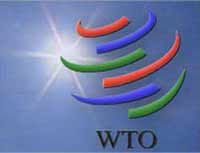World Trade Organization counts its last days
The World Trade Organization continues to give up its spirit. The administration of the organization and trade ministers of world’s leading states have been making attempts to save the organization within the scope of current talks in Geneva. However, the miracle might not happen. Trade has become a synonym to rationality in the course of human history. The organization will be saved if the good of its existence outbalances its losses. Otherwise, they will think of something else.

Technically, the WTO currently holds the Doha round of negotiations. The round optimistically started in November 2001, but time showed very little progress at this point. It became clear in 2003 that it would not be possible to come to an agreement about the formulae to cut subsidies.
The conference in Mexico’s Cancun ended with a complete failure in September 2003. A similar result was achieved in almost two years in Hong Kong: members of the talks agreed to liberate their markets, but everyone had their own opinions regarding the methods of how and to which extent the market liberation should be performed. In July 2006, WTO’s Director General Pascal Lamy stated that the Doha round of negotiations had been suspended. Nowadays, the official believes that it will be possible to improve the situation.
However, the state of current affairs at the WTO leaves much to be desired. A large number of its members is one of the biggest problems. For example, only 30 countries of 150 WTO members are represented at the current talks. It goes without saying that world’s biggest and most developed countries participate in the negotiations, but the world is different today: one can expect any surprises (including big troubles) from small countries.
Now it is not the time, when developed Western countries can impose their point of view on other states and say that trade can be freer for some. The current era of global interdependence and the ongoing rise of the developing world stipulate the need to negotiate too many things with too many countries.
The WTO currently discusses questions about the situation in the agrarian and industrial sectors. It may seem at first sight that the developing world must attack the developed countries because of injustice on agrarian markets. However, the developing countries can be different.
The USA made a very big concession at the beginning of the current talks. The United States agreed to restrict annual subsidies to US farmers to $14 billion, although it could afford much bigger subsidies under WTO’s current conditions. It was a ridiculous concession to make, though: US farmers received $7 billion of subsidies last years and could only rejoice the double. Nevertheless, the US administration showed that developed countries always have room for maneuver.
The Economist decided to calculate the price of the failure of the current consultations. The calculation was obviously planned to prove the importance of the WTO. However, the result showed the opposite: 0.1 percent of the world product. This small number does not outbalance national interests, which means that there is no reason to modernize the WTO.
Politcom
Subscribe to Pravda.Ru Telegram channel, Facebook, RSS!


